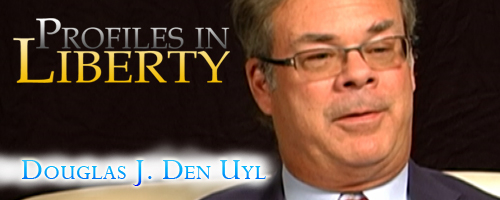
In this extended interview, philosopher Douglas Den Uyl responds to a series of questions about his life and work. Den Uyl is the author of many works. His latest book, co-authored with Douglas Rasmussen, is Norms of Liberty: A Perfectionist Basis for Non-Perfectionist Politics.

Why did you become a philosopher? [0:19]
Where did you get your degrees? [1:44]
Why does liberal society need a philosophy? [2:17]
What are the key themes from your book God, Man, and Well-Being: Spinoza’s Modern Humanism? [3:34]
How do you reconcile Spinoza’s deterministic metaphysics with liberalism? [8:35]
Would you say that Spinoza is more of an individualist than a consequentialist? [9:34]
 What are the key themes from The Virtue of Prudence (1991)? [0:09]
What are the key themes from The Virtue of Prudence (1991)? [0:09]
What are the key transitions in the decline of the importance of prudence among the virtues? [2:15]
Is prudence making a comeback in contemporary philosophy? [4:06]
What are the key themes from Norms of Liberty: A Perfectionist Basis for Non-Perfectionist Politics (2005)? [4:40]
What are some of the key metanorms that liberal society requires? [7:32]
What would the outlines of that ethical framework be? [10:06]
From which historical philosophers have you learned the most? [11:17]
What aspects of Aristotle’s thought are most important to you? [13:22]
 Previous question continued. [0:14]
Previous question continued. [0:14]
What appeals to you about 18th century philosophy? [1:45]
From which contemporary philosophers have you learned the most? [3:35]
What aspects of Ayn Rand’s thought are most important to you? [4:24]
What aspects of Ludwig Wittgenstein’s thought are most important to you? [5:37]
What major historical philosopher do you most disagree with? [6:07]
What are your thoughts on John Stuart Mill? [7:45]
What is the hardest philosophical problem you are working on now? [8:34]
What is the most challenging criticism of your views? [9:44]
What is the state of liberal thought today among philosophers? [10:59]
To bring about a more liberal society, what key practical steps can and should be taken? [12:18]
Previous Profiles in Liberty:
Philosopher Douglas Rasmussen.
Economist David R. Henderson.
Philosopher Tibor Machan.
The Profiles in Liberty main page.
Very interesting interview.
I thought the distinction drawn between ancient ethics (what duties do you owe yourself) and modern ethics (what duties do you owe others) was interesting. Can you or Dr. Den Uyl recommend a good paper or (shortish) book, accessible to the educated layman, that would give one an overview of that transition and the factors behind it?
BTW, I recently read your book on Nietzsche and the Nazis and found it excellent. A very nicely produced book as well.